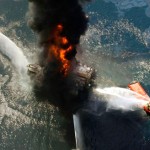Oil Spill Report Calls for Safety Overhaul
 The commission investigating the Gulf oil spill released its final verdict Tuesday and there's plenty of blame to go around.
The commission investigating the Gulf oil spill released its final verdict Tuesday and there's plenty of blame to go around.
Oil executives have been giving an earful to Bill Reilly, the Republican co-chairman of the federal commission investigating last year’s Gulf spill, about the panel’s criticisms of the deepwater drilling industry’s safety culture.
We, the execs harrumphed, run tight ships. We don’t cut corners. We have safety systems in place.
Fair enough. As the nuclear industry learned following the Three Mile Island accident, however, it only takes one complacent operator, one weak link in the value chain that turns raw minerals into usable energy, to threaten an entire industry.
As it turned out in the Gulf oil spill, there were several such weak links. Neither oil producer BP, nor oilfield servicer Halliburton, nor rig owner Transocean, nor the federal government came out of the Deepwater Horizon business with much to crow about.
At Tuesday's press briefing rolling out the panel’s report detailing the pervasive carelessness at the root of the Deepwater Horizon disaster, the systemic failure to manage deepwater drilling’s risks, and corrective recommendations, Reilly said it’s clear that the U.S. deepwater industry is not keeping up with the Jones’ when it comes to operational excellence. In U.S. waters, the worker fatality rate is 5 per 100 million hours worked. In the North Sea, the rate is only 1 per.
Hence the commission’s recommendation that oil companies establish a deepwater industry safety institute to set standards, carry out inspections, and prod sloppy operators to shape up.
It's in the industry’s own best interest to up its game on safety, Reilly said. "Much as the aviation and chemical and nuclear power industries have done in response to disasters, the oil and gas industry must move towards developing a concept of safety as a collective responsibility."
Not that all of the onus for the Deepwater Horizon should land on industry's shoulder. Its partner in complacency has been the federal government, long a mediocre, easy-squeezy landlord of the public’s marine estate that has settled for leaving oversight of offshore energy producers to an outmatched, underperforming captive regulator.
The commission recommended putting enforcement of deepwater safety standards into the hands of an independent agency headed by an energy pro. That person should serve a fixed term, to minimize political pressure from congressmen who see nothing untoward in substituting their political agendas for the judgment of technical experts in managing the nation’s marine resources.
There's a bigger picture to consider as well. One of the more inane comments to surface in the media at the height of the spill was Sarah Palin's wild charge that the oil industry was forced into the high risks of deepwater drilling because enviros have locked up shallower seas and federal lands.
That question came up at today’s briefing. While allowing that the now-expired offshore drilling moratoria had been too extensive, Reilly borrowed a line from Willie Sutton to explain the realities of today's oil industry: "We’re in deepwater because that’s where the oil is."
As long as we're dependent on oil, deepwater is where the industry will remain. Getting off the oil dependence treadmill will take time, so as long as deepwater production is necessary, it will behoove industry and the federal government to exercise greater rigor in managing and overseeing it.